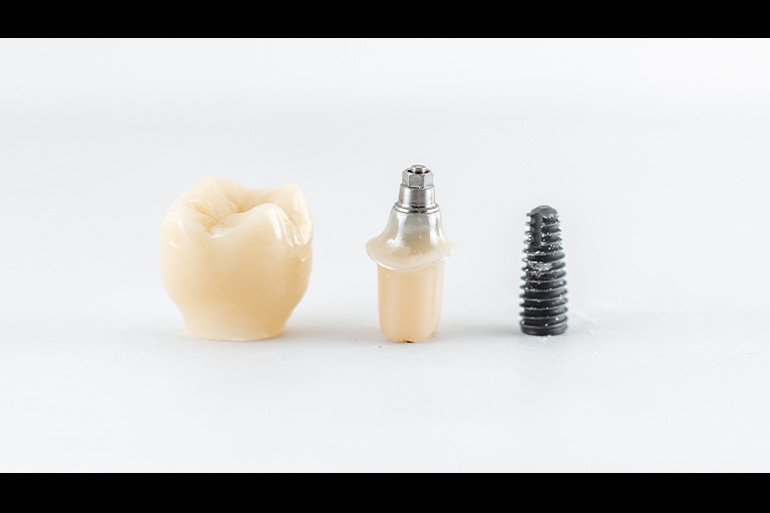
Dental Implant Treatment in Turkey
Dental implant surgery is the first and most important step in a procedure that replaces tooth roots with metal, screw-like posts and replaces missing teeth with artificial teeth that look and function very much like real teeth. Dental implant surgery has developed quite a bit as the most accurate alternative to poorly fitting dentures or bridges. It is also highly preferred in cases that prevent the application of prosthesis or bridge tooth method due to the lack of natural tooth roots.
How dental implant surgery is performed depends on the type of implant and the condition of your jawbone. Dental implant surgery may involve several procedures. The biggest benefit of implants is that they provide solid support for your new teeth.
Why Should You Prefer Turkey For Dental Treatment?

Turkey is a modern country with well-trained health personnel. The excellent dental tourism facilities are comparable to any other country in Europe. The best clinics are modern and equipped with the latest technologies, including 3D/CT scanning, digital x-ray and computer-aided design/computer-aided manufacturing (CAD/CAM). Therefore, Turkey has the expertise and facilities to offer excellent quality at affordable prices.
Why is the implant done?
Dental implants are surgically placed in your jawbone where they serve to replace the roots of missing teeth. Because the titanium in the implants fuses with your jawbone, the implants do not slip, make noise, or cause bone damage as with fixed bridges or dentures.
How is a Dental Implant Placed?
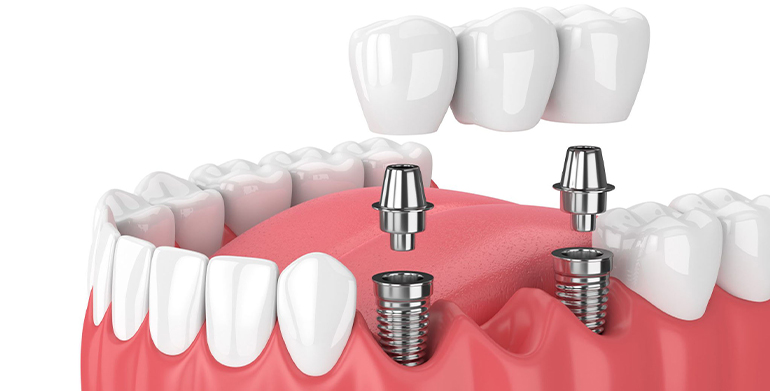
During dental implant placement surgery, your oral surgeon makes a cut to open your gums and expose the bone. A hole is drilled into the bone where the dental implant metal post will be placed. Since it will act as a tooth root, it is implanted deep into the bone.
Immediately after this procedure, there will still be a gap where your tooth is missing. If necessary, some type of partial, temporary prosthesis can be placed for appearance.
After the metal implant post is placed on your jawbone, osseointegration begins. During this process, the jawbone grows towards the surface of the dental implant and fuses. This process, which can take several months, helps lay a solid foundation for your new artificial tooth, just as roots do for your natural teeth.
This minor surgery is generally performed in an outpatient setting with local anesthesia. Sometimes it may be preferable to do it under general anesthesia.
Who Is The Implant Suitable For?
• If you have one or more missing teeth
• Having a full-grown jawbone
• To have enough bone to fix the implants
• Having healthy oral tissues
• None of health conditions that will affect bone healing
• Your being unable or unwilling to wear a prosthesis
What are the Advantages of Dental Implants?
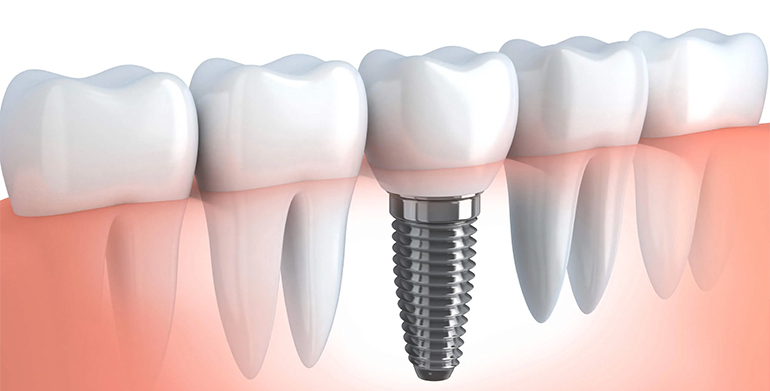
Not only do they feel like your own teeth, but you look like them too. Compared to a conventional bridge, adjacent teeth must be ground to support new teeth and close a gap. Healthy tooth is preserved when dental implant treatment is performed. Other important advantages of the implant are as follows.
• Dental implants protect against bone loss.
• Due to the natural load on the bone, the face preserves its profile and natural facial expressions.
• Prosthesis can be firmly fixed to dental implants.
• You save patients from the disadvantages of traditional prostheses.
• Implant supported dentures are more comfortable for patients using fully removable dentures.
• In addition, there is no prosthetic material on the palate.
• This also has a positive effect on speech and pronunciation.
• Prostheses do not slip or fall
• Neighborhood teeth do not need to be grinded (no loss of healthy tooth material)
• A prosthesis fixed to dental implants has excellent grip, inflammatory pressure sores are rare
• There is no bone loss in the jaw.
• Unloaded bone causes facial reductions, as in conventional prostheses. For this reason, the face takes an aged appearance over time.
• A natural appearance is provided with the implant.
• The mental stress of wearing a removable prosthesis never arises.
Risks of Dental Implant
Like any surgery, dental implant surgery carries some health risks. Problems are rare and when they do occur they are usually minor and easily treated. Dental implant risks are as follows.
• Implant site infection
• Injury or damage to surrounding structures such as other teeth or blood vessels
• Nerve damage that can cause pain, numbness, or tingling in your natural teeth, gums, lips, or jaw
• Sinus problems may occur when dental implants placed in the upper jaw come into contact with one of your sinus cavities.
Is dental implant treatment a painful procedure?
Dental implants are considered the best option to replace missing or damaged teeth. The procedure is not painful as it is performed with general or local anesthesia to completely numb the mouth.
Mild pain may be felt by the patient after the numbness subsides after job implantation. This can be quickly relieved with painkillers.
How Long Can a Dental Implant Be Used?
The implant can be used for a lifetime by maintaining good oral hygiene with proper brushing and flossing. It's also important to complete regular dental checkups and professional cleanings. Normally, over time, of course, depending on the material used, after wear and tear, not the implant, but the tooth placed on it will need to be replaced.
How long does the dental implant procedure take?
The procedure itself takes 1 to 2 hours, and the recovery period is 3 to 6 months. During this time, the titanium alloy (the same material used in joint replacement) implant will heal and fuse with the surrounding bone tissue. No other load-bearing medical implant has such fast healing or recovery times.
How soon after tooth extraction can you have an implant?
It usually takes place two or three months after an extraction. The waiting time depends on the healing of your gums. If you have an oral infection, this also needs to be cleared before placing the implant.
Do dental implants fall out?
It is a rare possibility for a real dental implant to fall out. However, if the implant does fall, the patient should be examined and other appropriate options given. The Healing Abutment Screw is the Most Commonly Mentioned by Patients as Dental Implants Falling, but this does not necessarily mean implant falling out.
Will there be cavities in dental implants?
Dental implants are made of titanium and porcelain, none of which are affected by cavities. It's not rotten. However, it is very important to keep your gums healthy before and after implant placement.
Why should you have an implant in Turkey?
• Reasonable prices
• First class material
• Turkish hospitality
• Experienced doctors
• You can plan the treatment together with the holiday
What Is It Like After the Implant Procedure?
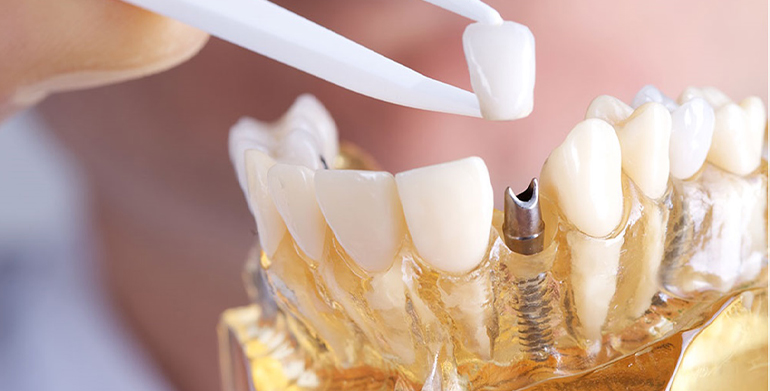
Whether you have your dental implant surgery in one-stage or multiple stages, you may experience some of the typical discomforts associated with any type of dental surgery.
For example:
• Swelling of your gums and face
• Blueing of your skin and gums
• Pain at the implant site
• Minor bleeding
You may need pain medication or antibiotics after dental implant surgery. You should contact your oral surgeon if swelling, discomfort, or any other problem occurs and worsens in the days after surgery.
You may need to eat soft foods while the surgical site heals. Typically, your surgeon will use self-dissolving sutures. If your stitches don't dissolve on their own, your doctor will remove them.
What Should You Do for Dental Implant Treatment in Turkey?
To have dental implants in Turkey, you can contact the clinics with 24/7 expert teams and request their specialists to prepare a treatment plan for you. It is easy to make an appointment for treatment. If you have a panoramic x-ray, you can get a free treatment plan. But if not possible, if you share photos of your smile along with information about your expectations. Experts will help you plan from start to finish. You can also get translation, transfer and accommodation services upon your request.
Is Dental Implant Safe in Turkey?
Dental Implants act as artificial roots for teeth. It is made of titanium, which is non-allergenic and the human body does not react to it as with a foreign body. For over 40 years, the use of titanium implants has become an industry standard in dentistry. Thanks to this fact, dentists have years of knowledge, scientific research and experience on implants. If you are considering a dental implant in Istanbul, all you have to do is contact a specialist or clinic so that we can assist you.
Is Dental Implant Guaranteed in Turkey?
Most of the dental clinics in Turkey, in addition to the treatment provided by the dentists, guarantee your treatments such as crowns, veneers, implants or dentures.
Dental Implant Costs in Turkey
As in all other health services, dental treatment costs are almost 70% below that of America and Europe. Turkey plays an important role in the field of health tourism on a global scale. This provides great advantages for patients coming from abroad.
Dental Implant Prices in Turkey
While the cost of dental implant operation in Istanbul is around $500 – $750, you can have this operation for $5,000 with the same service quality in America, England or most European countries.
Istanbul certainly offers a comfortable and quality dental care service at approximately 70% cheaper prices compared to the EU, UK and USA.
Which Payment Methods Are Accepted in Turkey?
Mastercard, Visa credit and debit cards are accepted in cash (Turkish Lira, Dollar and Euro) in most dental clinics. Also bank transfer you can pay.
Why is Turkey Popular in Medical Tourism?

Turkey is one of the top ten destinations for medical tourism worldwide. Turkish Health Tourism has three main advantages. Low cost, high quality care and fast access to world class treatment. The biggest advantage of Turkey is that it saves money compared to other countries. Most procedures are half or less than half the price in the EU. Turkey is in a central location. It is only 2-3 hours away from European and Middle Eastern cities. Citizens of more than 70 countries can travel to Turkey without a visa.
About 55% of more than 1200 hospitals in Turkey belong to the Turkish Ministry of Health. The rest is owned by universities, private companies and foreign institutions. Many hospitals have links with JCI (Joint Commission's International), JACHO (Joint Commission on Accreditation of Healthcare Organisation), ISO (International Organization for Standardization) and Western medical groups and institutions, as well as local and international accreditations.
Do You Need a Visa to Turkey?
For many countries, you can easily obtain a visa for 90 days per trip. However, for holders of US, UK, Australian, Chinese and Spanish passports, e-visas must be obtained in advance for a fee upon arrival. Holders of French, German, Russian and Singaporean passports can enter visa-free. Citizens of more than 70 countries have the right to enter Turkey without a visa.
Transportation to Turkey
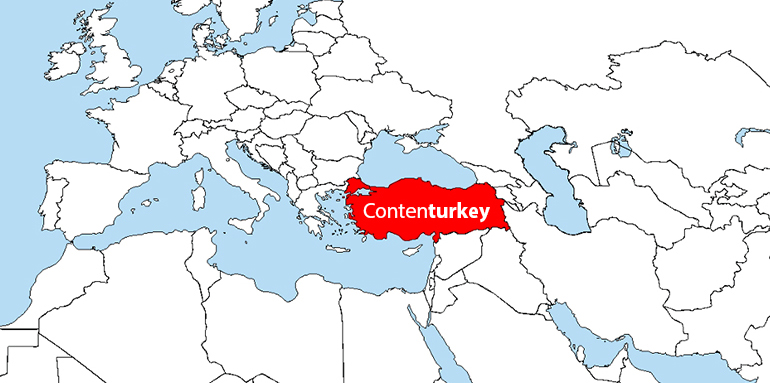
Turkish Airlines is one of the largest airlines in the world, flying to more than 100 countries and 200 international destinations. Turkish Airlines' extensive flight network provides easy and economical transportation to patients from all over the world.
Turkey's private hospitals offer the world's most advanced medical treatments and technology today. In addition to its technologically advanced medical infrastructure, Turkey is a leading health tourism destination with many advantages.
Fill out the form to schedule "Free Dental Implant".
Plan your Dental Veneers and dental aesthetics journey with Contenturkey today!
Do you know that you can visit Turkey's most competent hospitals and clinics specialized in Dental Veneers through Contenturkey with special privileges? To do this, simply fill out the form below.
In a short time, authorized health communication units will contact you and convey all the details together with the price information.
Moreover, when you join the Dental Veneers programs via the form below, you can benefit from the 5% discount privilege as a visitor to our website!
WARNING: Contenturkey.com has no partnership with any clinic, hospital or doctor. The content on our page has been created to inform you about your health tourism experience in Turkey. Please consult your doctor for any diagnosis and treatment. We are not responsible for any health problem you may experience for any reason.
In addition to all this, the information we create and share under medical and medical titles should not be interpreted as treatment advice. No explanation is a substitute for a doctor's visit.
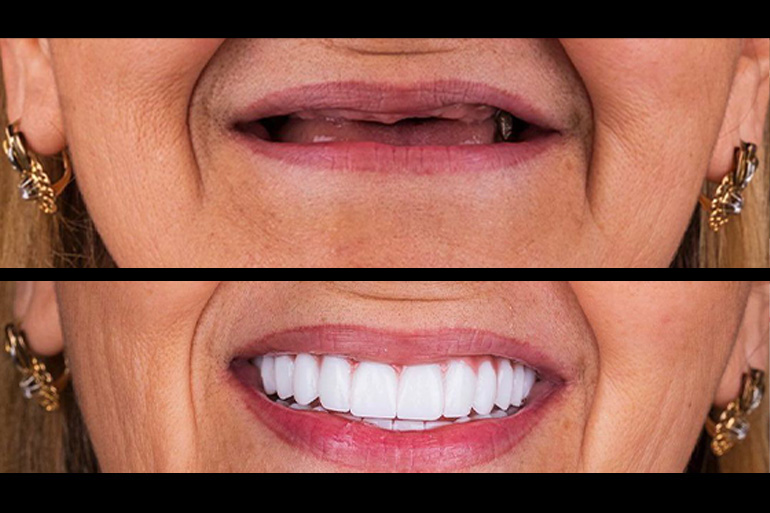
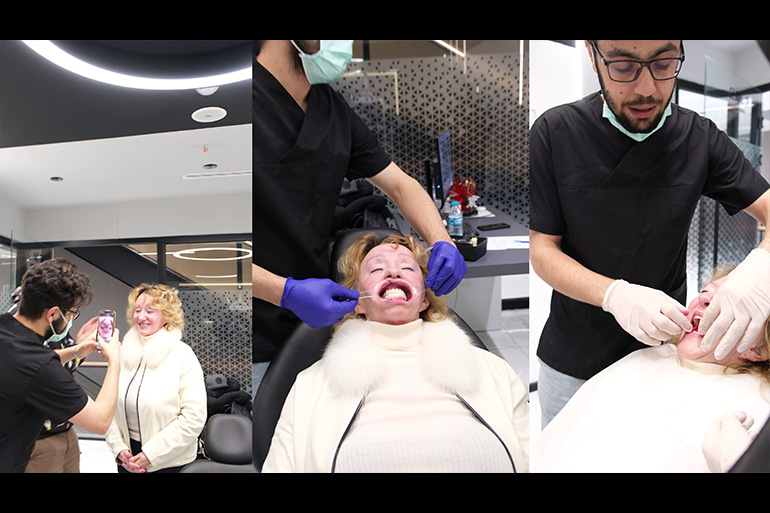
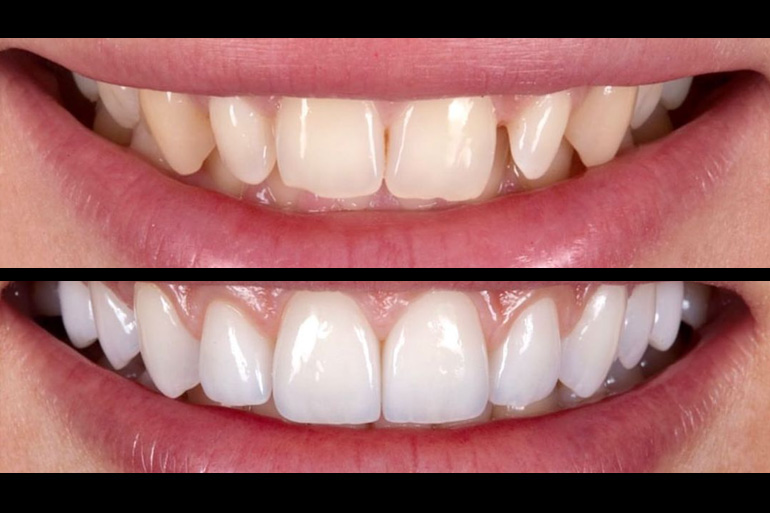
0 Comment
Comment